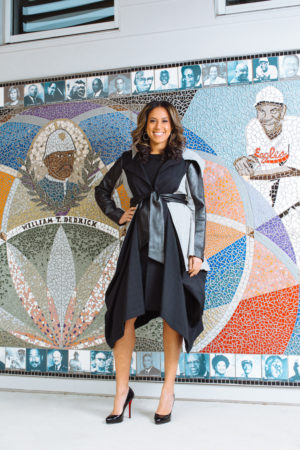The first female president and CEO of the Greater Austin Black Chamber of Commerce talks about taking calculated risks and thinking outside the box to lead and grow the organization.
By Shelley Seale
In life, you have to take risks to achieve rewards, says Natalie Madeira Cofield. It’s a mantra that she has lived by, and the rewards she has attained are proof.
 Originally from Rochester, N.Y., Cofield was ambitious from a young age, graduating from high school and entering college at just 16 years old. After obtaining an honors degree in information systems from Howard University and graduating from the Baruch School of Public Affairs in New York, Cofield found inspiration at the nexus of business, community and politics.
Originally from Rochester, N.Y., Cofield was ambitious from a young age, graduating from high school and entering college at just 16 years old. After obtaining an honors degree in information systems from Howard University and graduating from the Baruch School of Public Affairs in New York, Cofield found inspiration at the nexus of business, community and politics.
“I became inspired by the role of minority businesses in under-served communities as a teen while working as a mail clerk, administrative assistant and printing aid for an industrial company listed as a Black Enterprise 100,” she says.
Cofield carved a niche for herself as an entrepreneur, advocate, economic development director and speaker on all things startup and diversity, working in tech, nonprofit and international development. She has been a keynote speaker
for such high-profile global companies as IBM, Dell, Applied Materials, Google and Facebook. In 2010, she testified before the U.S. Senate Committee on Small Business & Entrepreneurship and authored The Pursuit of Entrepreneurship: A Guide for African American Entrepreneurs.
It’s all pretty impressive for a woman who was not yet 30.
Her Journey To Austin
In 2011, Cofield was living in Washington, D.C., and running her own consulting firm when Austin came calling. The Greater Austin Black Chamber of Commerce was looking for a new president, and a member of the board of directors thought Cofield would be a perfect fit.
“At the time, I was adamant about not moving from Washington, D.C.,” admits Cofield, now 33. “It was a move to be a community leader in a community I knew nothing about. I knew no one here, I had no friends or family nearby.”
She visited the city for one day during her interview process and began doing some research. The Silicon Hills tech environment was appealing, and Cofield says Austin seemed like a fun city in which to live.
“I knew it wouldn’t be D.C., LA or New York; it would be like nothing I’d ever experienced before. I had made a name for myself in D.C., and I saw the opportunity to do the same thing here and to demonstrate my capacity to be a turnaround CEO,” she says. “The opportunity seemed like such a great chance for me as a young woman of color to give back to a fast-growing city.”
Still, Cofield admits the move was a very trying experience.
“I was extremely lonely at times, and often cried myself to sleep at night,” she says, adding that she also had to adjust her professional expectations. “I came here thinking that what I did in D.C., I would do in Austin. But I realized I had to develop relationships and connections first, I had to understand the culture here. I was really brought to my knees.”
Turning The Black Chamber Around
Despite the challenges, she quickly made it work, rehabilitating the entire chamber organization. When Cofield joined the GABC, she was the youngest president of a black chamber in the country for a Top 15 city. In less than five years, she led the GABC from a struggling organization to the largest black chamber in the state, and she is now the most tenured president among the state of Texas’ large cities.
 Today, the GABC has more than 400 members and has been covered by The New York Times, Fast Company and
Today, the GABC has more than 400 members and has been covered by The New York Times, Fast Company and
the Austin Business Journal, among others.
“I have really been able to blend all my previous experiences in my current role as president and CEO for the Greater Austin Black Chamber of Commerce,” Cofield says. “My job is to be an advocate for small-business development and creation in Austin. We work with local companies to help them grow and expand nationally and internationally to assist the city of Austin with relocation of businesses to the region. The chamber helps to give a voice to the black business community, whether they may or may not be present.”
One way the chamber is doing that is with a new diversity initiative, #IAmBlackAustin, which launched in January. This is a digital and social-media campaign designed to highlight the multi-dimensional aspect of black life in Austin.
“We are only 8 percent of the population here,” Cofield says. “#IAmBlackAustin is meant to change the paradigm of thought. It says, ‘I see you, black paddle-boarder on Lake Austin. I see you, black BMX rider.’ As Austin grows, there’s a need for a new narrative, one that still can include the old narrative.”
Cofield says the biggest threat to entrepreneurial activity in any community is a declining population.
“This is the situation we have with Austin’s declining black community. We, as a community, must work to reverse this trend. I do believe that there are great opportunities for businesses in Austin. Research shows that African-American businesses in Austin are faring better in revenues than their counterparts in Houston, Dallas and San Antonio.”
Technology and Austin’s Connection to the Global Community
In recognition of the fact that Austin has become one of the fastest-growing technology markets in the country, Cofield has worked to establish Austin as a mecca for minorities in technology through aggressive national outreach campaigns and the cultivation of strong relationships within the Austin technology ecosystem. She led the GABC in founding the Austin Black Technology Council, and won the Google Diversity Evangelist of the Year Award in 2013.
The BTC’s mission is to accelerate engagement and entrepreneurship, identify and share best practices throughout the industry, and encourage inclusivity and representation amongst black technology professionals in the greater Austin region. Technology members were featured on the cover of {Black Enterprise} magazine in a special issue that highlighted the city of Austin.
Given the chamber’s focus on the African-American and African diaspora communities, it also has a mission of connecting Austin to global markets, including South Africa, Kenya and Brazil. In 2012, the chamber signed a bilateral memorandum of understanding with Sao Paulo-based Zumbi Dos Palmares, the first university focused on African descendants in South America. In 2013, it created the South By Southwest African Diaspora Fellowship, designed to create a bridge between the two growing technology economies of Austin and Nairobi, Kenya, bringing Nivi Mukherjee and Simeon Oriko from Kenya to attend the South By Southwest Interactive Festival.
Women Entrepreneurs of Color
“ My mom has always been a great source of inspiration and motivation for me,” Cofield says. “When I was a little girl, I would read her business plans, and she has always entrepreneurially inspired me.”
My mom has always been a great source of inspiration and motivation for me,” Cofield says. “When I was a little girl, I would read her business plans, and she has always entrepreneurially inspired me.”
Other role models include Alexis Herman, U.S. secretary of labor under President Clinton, and Madam C.J. Walker, the first self-made female CEO and millionaire in the history of the United States.
“I would often read Madame Walker’s biography because, for the time in which she lived, she did really amazing things that inspired women of generations to come,” she says.
In the footsteps of these inspiring women, Cofield founded Walker’s Legacy in 2009. The organization acts as an ecosystem for Women Entrepreneurs of Color, a professional collective that works to promote the career advancement, skill sets and networks of women in business and women entrepreneurs.
Women who engage with Walker’s Legacy, affectionately known as Walkers, are women who aspire to start their own businesses or are looking to enhance their knowledge of achieving success in corporate America and their network of like-minded progressive women. Walker’s Legacy provides these women with a support group, and empowering and educational programming that has featured former female mayors, award-winning journalists and authors, Forbes-ranked businesswomen and entrepreneurs from throughout the country. It currently operates in five U.S. cities and has been featured in national outlets, including Fast Company and Black Enterprise.
Being a Role Model
Cofield’s resume speaks for itself in terms of role-model material. Cofield serves on the board of the CleanTX Foundation; Biodrill, a renewable energy technology firm; and is a member of the President’s Council for the U.S. Black Chamber Inc. In 2013, she was named the Technology Diversity Evangelist of the Year by Google and one of the Top 10 Black Innovators by MVMT50, an initiative of South By Southwest. In 2012, she was named a 20-30 Something to Watch in Austin, Texas, by Austin Monthly.
Cofield is extremely cognizant of being a young, professional woman of color. While she looks up to her own role models, she definitely feels the responsibility of being a role model herself to others who come down the path behind her.
“I wanted to be able to show young people around the country that you can achieve great things by taking on challenges,” she says. “I knew I could make my career into whatever I wanted it to be; it all depended on what I invested in it. This gives me the opportunity to inspire other people. I’m hoping that millennials will look at me and say, ‘I can have an amazing career and do good in the community at the same time.’ ”
Natalie Maderia Cofield’s Favorite Things to Do in Austin:
- Running Town Lake

- Boating at Lake Austin
- Hosting people at her place
- Brunching
- Going to all the concerts and festivals our city has to offer
- Having a drink at the W Hotel
Natalie Maderia Cofield’s Recommended Books:
- The 4 Hour Workweek
- On Her Own Ground: The Life and Times of Madame C.J. Walker
- Lean In: “This was a great book on women and leadership, but the truth is my mother has been my greatest book ever.”
About the Greater Austin Black Chamber
The Greater Austin Black Chamber of Commerce (GABC) promotes the development of African-American businesses and the expansion of the greater Austin business community by providing resources, technical assistance and leadership on policy issues that enhance economic growth and by promoting convention and tourism.
GABC signature programs:
- Annual Small Business Award Gala. The event recognizes the accomplishments of and provides visibility for outstanding business owners and professionals.
- Procurement Series. These workshops feature talks on a wide variety of topics that are helpful for anyone involved with a business, from owners and managers to entry-level employees.
- Economic Development Missions. Each year, the Greater Austin Black Chamber of Commerce conducts two economic-development missions, with the goal of increasing international business opportunities for minority businesses and marketing the Austin community abroad. Economic-development missions may be closed or open to members of the chamber, and notification is provided in advance.
- Evening Networking/Breakfasts. These events provide an opportunity for members and sponsors to network with each other. On occasion, other groups are invited to attend to expand these opportunities.
- South By Southwest. The interactive programming spotlights blacks in technology during the annual Austin interactive festival event in March.
- State of Black Business. This program features business experts and leaders as they discuss the state of African-American businesses within the Central Texas region, including statistics and facts.
- State of Black Education in Austin. An in-depth analysis of African-American students’ education in Austin is explored and reported. A commitment to improving the landscape and providing a rich talent pool is the focus.
